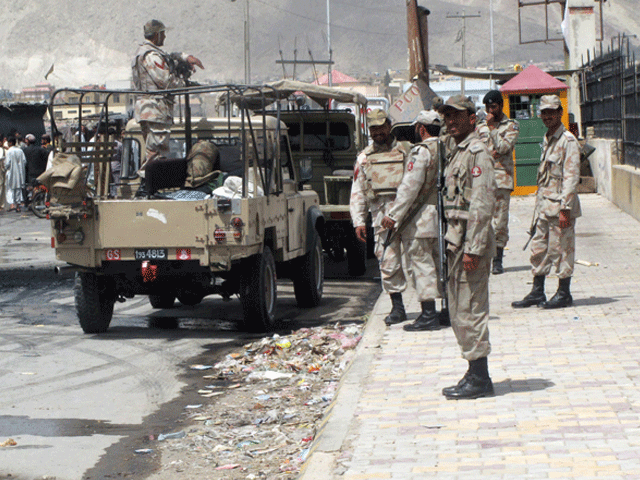
The recent attack on the Jaffar Express has once again exposed India’s continued sponsorship of terrorism in Pakistan, particularly in Balochistan. As revealed by Director General (DG) of Inter-Services Public Relations (ISPR), Lt Gen Ahmed Sharif Chaudhry, the attackers—linked to the Balochistan Liberation Army (BLA)—used Indian and Afghan weapons, highlighting a disturbing nexus aimed at destabilizing Pakistan. The attack, which resulted in 26 passenger casualties and a two-day counter-terrorism operation, underscores the broader security challenges emanating from India’s hybrid warfare strategies.
Lt Gen Ahmed Sharif Chaudhry unequivocally pointed to India as the primary sponsor of terrorist activities in Balochistan. The use of Indian-supplied arms in the Jaffar Express attack aligns with past patterns of Indian involvement in subversive activities inside Pakistan. Over the years, Indian intelligence agencies, primarily the Research and Analysis Wing (RAW), have systematically fueled insurgencies in Balochistan through financial and logistical support to separatist groups such as the BLA and the Balochistan Liberation Front (BLF). The Jaffar Express attack is but one in a series of Indian-backed operations designed to challenge Pakistan’s territorial integrity and economic stability, particularly targeting China-Pakistan Economic Corridor (CPEC) projects.
A significant component of India’s strategy against Pakistan involves disinformation campaigns aimed at shaping global perceptions. The DG ISPR highlighted how Indian media disseminated AI-generated images and fake videos to distort facts about the Jaffar Express attack. This aligns with India’s broader hybrid warfare approach, which includes propaganda, cyber operations, and diplomatic maneuvering to malign Pakistan on international platforms. The deliberate spread of false narratives serves to delegitimize Pakistan’s counterterrorism efforts while justifying India’s aggressive posturing.
The swift and precise operation carried out by Pakistan’s security forces to neutralize the terrorists in Balochistan is a testament to their professionalism and strategic preparedness. Within 36 hours, the Special Services Group’s (SSG) Zarrar Company, supported by the Air Force and Frontier Corps, successfully rescued over 350 passengers without a single hostage casualty. This operation stands as one of the most successful hostage rescue missions in recent history. Pakistan’s forces executed a calculated strategy to eliminate the threat while ensuring civilian safety. The terrorists, who had strategically positioned themselves on higher ground and included suicide bombers, were methodically neutralized. Drone footage presented by ISPR showcased the coordinated efforts of the security forces, emphasizing their operational capability in high-risk environments.
A significant dimension of Pakistan’s counterterrorism challenge is the continued use of Afghan soil for launching attacks. The Jaffar Express attack further confirms that Baloch terrorist groups operate with external facilitation, including safe havens in Afghanistan. Islamabad has repeatedly called upon Kabul to take action against terror outfits like Tehreek-i-Taliban Pakistan (TTP) and BLA, but these pleas have largely gone unanswered. The presence of Afghan nationals among the assailants further solidifies Pakistan’s claims that hostile elements are exploiting Afghanistan’s territory to destabilize Pakistan.
The Jaffar Express attack highlights the urgency of implementing a robust counterterrorism framework in Balochistan. Pakistan’s National Action Plan (NAP) must be reinforced to eliminate terrorist networks and their facilitators. Some key policy considerations include:
- Enhanced Border Security – Strengthening border surveillance along the Pakistan-Afghanistan border to prevent cross-border movement of terrorists.
- Diplomatic Offensive – Engaging the international community to hold India accountable for its sponsorship of terrorism.
- Cyber and Information Warfare Preparedness – Countering Indian propaganda with factual, data-driven narratives to expose misinformation.
- Internal Counterinsurgency Measures – Expanding intelligence-based operations (IBOs) and dismantling sleeper cells operating in urban centers.
- Socioeconomic Development – Addressing grievances in Balochistan through economic uplift programs, job creation, and educational reforms.
Following the Quetta security conference, Prime Minister Shehbaz Sharif and Chief of Army Staff General Syed Asim Munir reaffirmed Pakistan’s commitment to national security. The consensus among political and military leadership is clear: Pakistan will counter any attempt to destabilize the country with full force. The unity of the state apparatus, coupled with decisive military action, is crucial in overcoming the threats posed by India’s proxy war.
The Jaffar Express attack is not an isolated incident but part of a larger geopolitical agenda orchestrated by India to weaken Pakistan. However, the resilience of Pakistan’s security forces and the determination of its people serve as a formidable barrier against such nefarious designs. Pakistan must remain vigilant, proactive, and united to dismantle terrorism at its roots and ensure the safety and prosperity of its citizens. The failure of India’s attempts to spread terror in Balochistan is inevitable, as Pakistan stands resolute in its defense.
